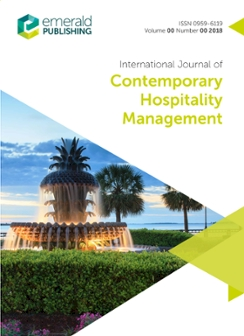Resilience in hospitality and tourism: issues, synthesis and agenda
IF 9.1
1区 管理学
Q1 HOSPITALITY, LEISURE, SPORT & TOURISM
International Journal of Contemporary Hospitality Management
Pub Date : 2022-09-28
DOI:10.1108/ijchm-11-2021-1428
引用次数: 14
Abstract
Purpose This paper aims to identify research approaches and issues in relation to the main paradigms of resilience: engineering resilience, ecological resilience and socio-ecological resilience. This paper provides a synthesis of the core elements of each resilience approach and their implications. Design/methodology/approach A critical thematic review was undertaken of the hospitality and tourism resilience literature. Findings Resilience is a contested boundary object with different understandings according to conceptual and disciplinary position. The dominant approach in hospitality and tourism studies is primarily informed by engineering resilience with the focus at the organizational level. The ontological and epistemological understanding of resilience and change concepts appears limited leading to a lack of appreciation of the multi-scaled nature of resilience and the importance of slow change. Research/limitations/implications The research has important implications for understanding the key elements of different approaches to resilience. Practical implications The research synthesis may help improve resilience strategy and policymaking, including indicator selection. Social implications The research notes the relationship of resilience to sustainability, the potential for learning and decision-making practices. Originality/value In addition to thematic analysis, a model of the multi-scaled nature of resilience is provided and the key elements of the three main approaches with implications for theory and practice.酒店和旅游业的复原力:问题、综合和议程
目的探讨工程弹性、生态弹性和社会生态弹性这三种主要弹性范式的研究方法和问题。本文提供了每个弹性方法的核心要素及其含义的综合。设计/方法/办法对酒店和旅游复原力方面的文献进行了重要的专题审查。弹性是一个有争议的边界对象,根据概念和学科立场有不同的理解。酒店和旅游研究中的主要方法主要是通过工程弹性来了解组织层面的重点。对弹性和变化概念的本体论和认识论理解似乎有限,导致缺乏对弹性的多尺度性质和缓慢变化的重要性的认识。研究/限制/启示本研究对理解不同弹性方法的关键要素具有重要意义。实践意义研究综合有助于提高弹性策略和政策制定,包括指标选择。社会意义该研究指出了适应力与可持续性、学习潜力和决策实践之间的关系。原创性/价值除了专题分析外,还提供了弹性的多尺度性质模型以及三种主要方法的关键要素,并对理论和实践产生了影响。
本文章由计算机程序翻译,如有差异,请以英文原文为准。
求助全文
约1分钟内获得全文
求助全文
来源期刊
CiteScore
16.90
自引率
31.50%
发文量
239
期刊介绍:
The International Journal of Contemporary Hospitality Management serves as a conduit for disseminating the latest developments and innovative insights into the management of hospitality and tourism businesses globally. The journal publishes peer-reviewed papers that comprehensively address issues pertinent to strategic management, operations, marketing, finance, and HR management in the field of hospitality and tourism.

 求助内容:
求助内容: 应助结果提醒方式:
应助结果提醒方式:


